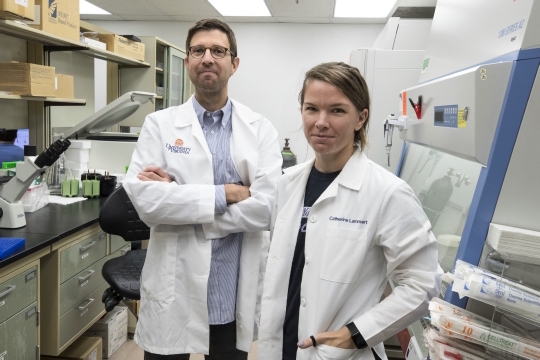Our John Lukens, PhD, and an outstanding graduate student, Catherine R. Lammert, have made a surprising discovery about neurodevelopment that could have implications for autism and neurodegenerative diseases such as Alzheimer’s.
The researchers have determined that an unexpected form of cellular cleanup occurs during neurodevelopment. Until now, this particular cleaning crew, the AIM2 inflammasome, has been associated primarily with the body’s immune response to infections. But Lammert and Lukens found it plays a critical role in neurodevelopment, removing faulty brain cells before they can become a permanent part of the central nervous system.
“You don’t want [brain] cells to have genomic compromises. You don’t want damaged DNA. So this would be a normal mechanism to expel those cells from being incorporated into the central nervous system,” Lammert told me. “When the damage isn’t recognized, the cells that have DNA damage live on in the CNS [central nervous system] and can be seen by accumulation of DNA damage in the brain.”
The researchers found that if the cleanup process goes wrong – whether there’s too little or too much – it can cause permanent changes. In lab mice, this resulted in anxiety-like behavior, and it may play a role in neurological conditions such as autism in humans.
“Too much or too little is thought to underlie everything from autism to intellectual disability – any type of neurodevelopmental disorder,” said Lukens, of our Department of Neuroscience and the Center for Brain Immunology and Glia (BIG).
The new discovery may one day help inform new treatments for neurological conditions, though Lukens warns that is a long way off. Such a therapy, though, might have widespread application. “Hitting this pathway in the mature brain would likely provide a treatment strategy for any neurodegenerative disease associated with DNA damage,” he said. “And that’s all the major heavy hitters: Alzheimer’s disease, Parkinson’s, ALS.”

Go information keep me posted it plz! Good luck in your research